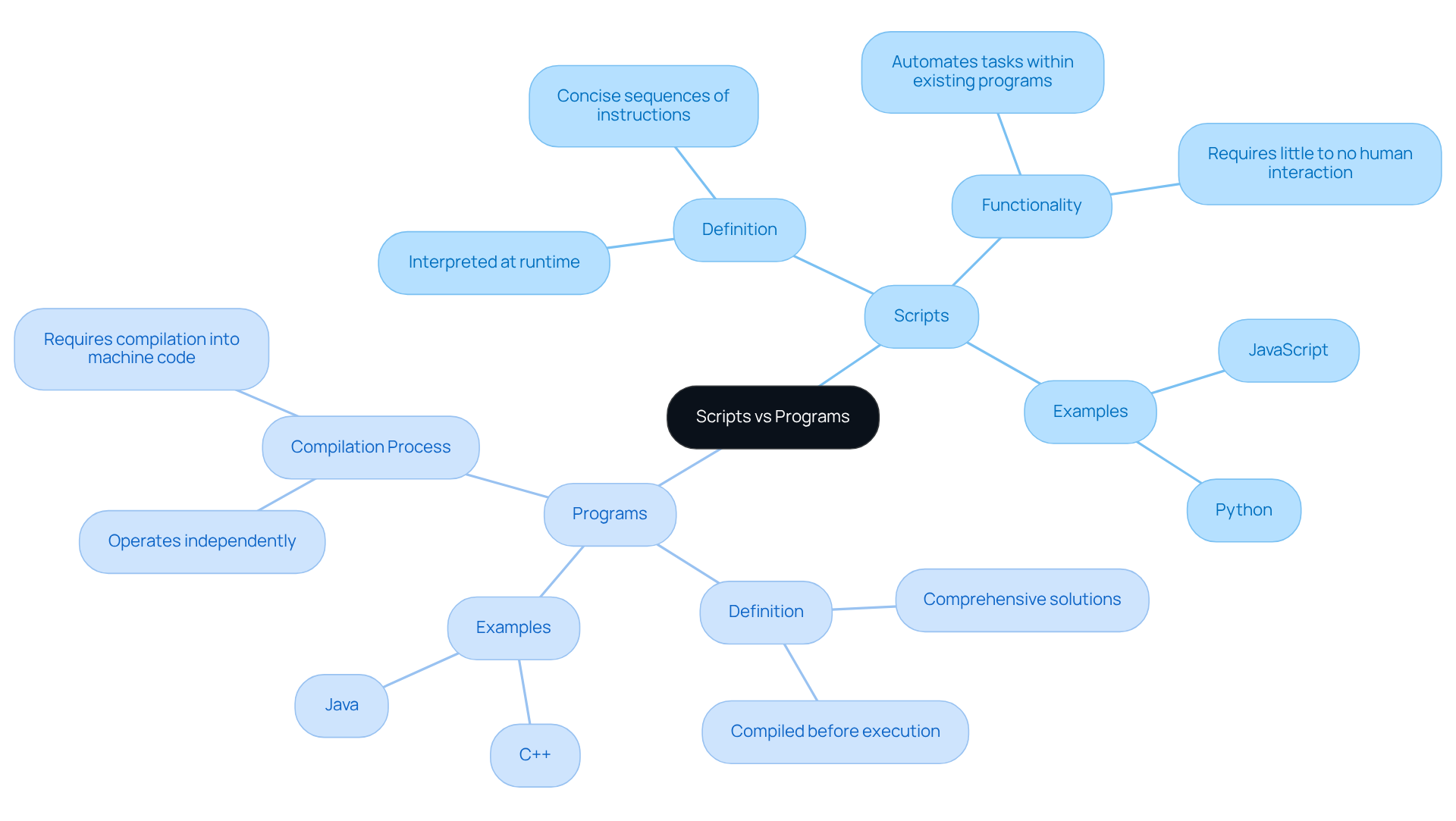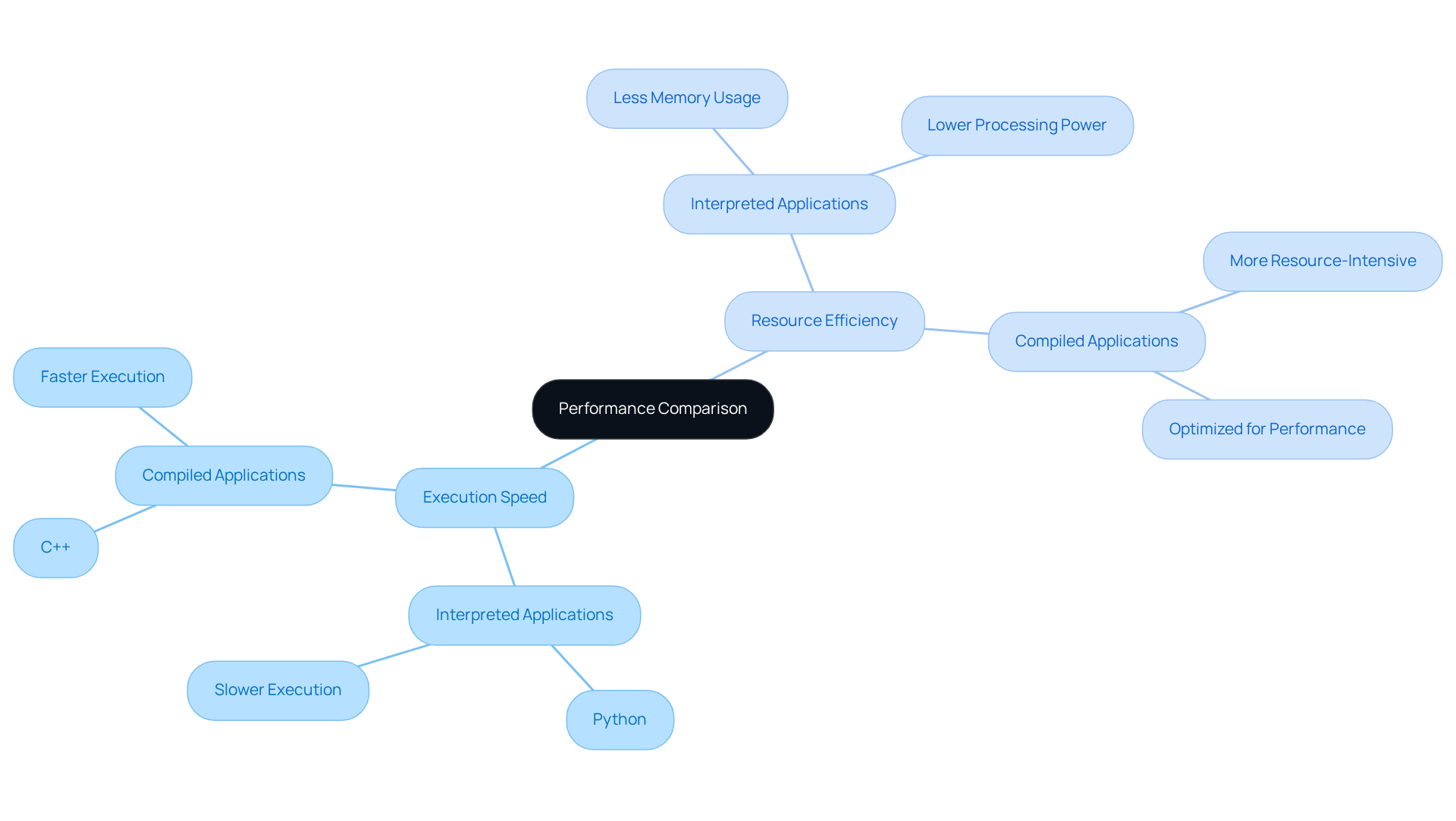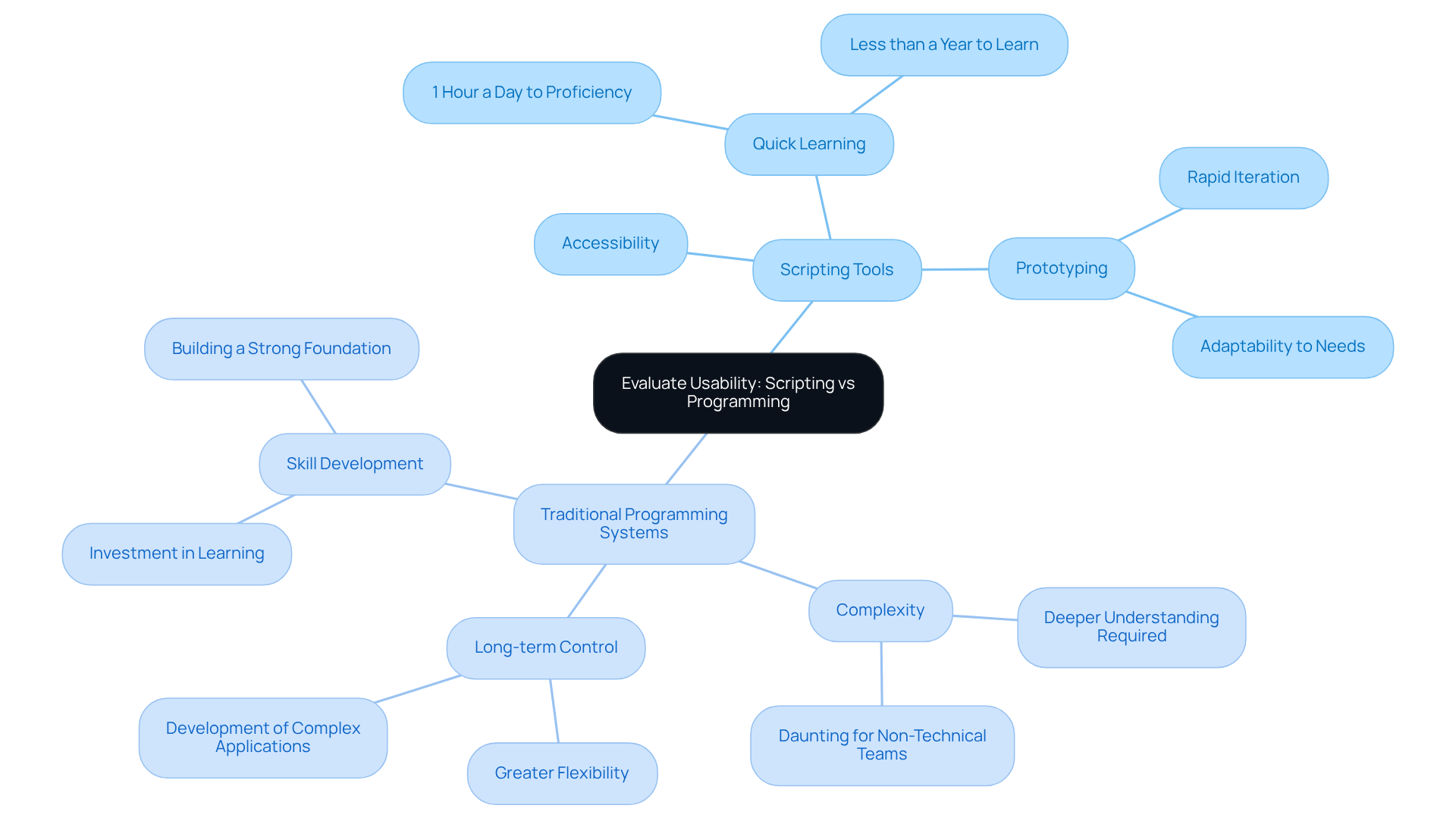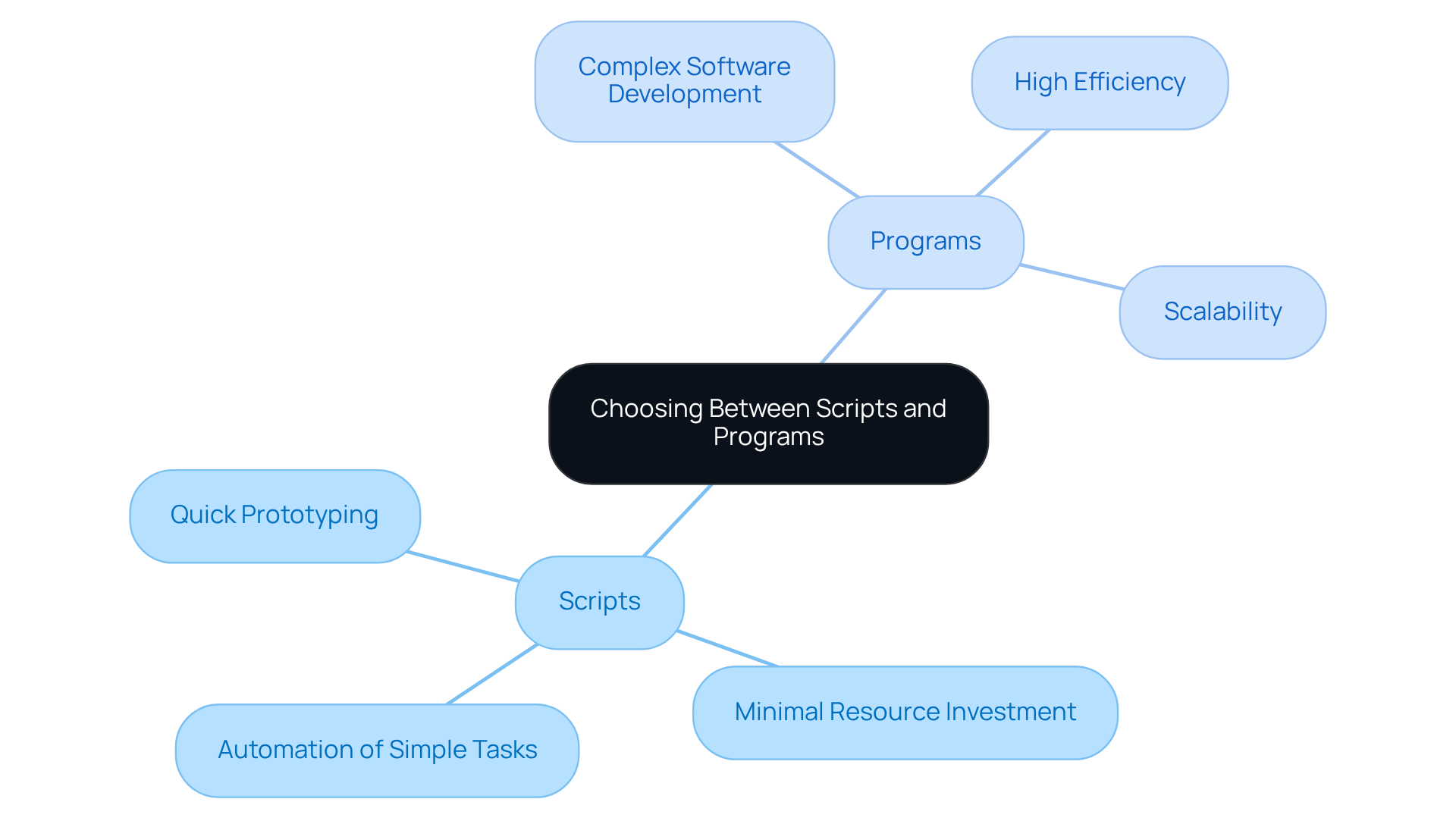Overview
For tech startup founders, navigating the landscape of development tools can often feel overwhelming. The decision between using scripts and programs is not merely a technical choice; it embodies the essence of your startup’s journey and aspirations.
- Scripts, with their simplicity and speed, offer a quick solution for automating tasks, making them an attractive option for those looking to streamline operations.
- However, the more complex programs demand a deeper understanding and are tailored for resource-intensive applications, which can be daunting for many.
This distinction is crucial, as aligning your choice with your startup's unique needs and long-term goals can significantly impact your path forward. By recognizing these differences, you can make informed decisions that not only address immediate challenges but also support your overarching vision. Remember, you are not alone in this journey; many founders have faced similar crossroads and found success by thoughtfully evaluating their options. Together, we can explore the best tools that resonate with your startup’s mission and foster growth.
Introduction
In the ever-changing world of technology, many startup founders find themselves grappling with the distinction between scripts and programs. This confusion can create significant hurdles in choosing the right tools, ultimately impacting project efficiency and growth. It's understandable to feel overwhelmed, as the landscape is complex and rapidly evolving.
By exploring the subtle differences between these two coding approaches, tech startups can discover pathways to more streamlined operations and improved productivity. Yet, with so many programming languages and methodologies emerging, how can you find the right fit for your unique needs?
Understanding the key differences between scripts and programs not only clarifies their functionalities but also highlights the strategic considerations that can influence your startup's development journey. Together, we can navigate these waters and empower your venture to thrive.
Define Scripts and Programs: Core Concepts and Contexts
In the world of technology, many founders grapple with a common challenge: understanding the difference between scripts vs programs. This confusion can lead to missteps in choosing the right tools for their projects, which is a source of stress.
Scripts, those concise sequences of instructions, are designed to automate tasks within existing programs or systems. They are typically interpreted at runtime, which means there’s no need for a compilation step before execution. Think of JavaScript, which breathes life into web pages, or Python scripts that simplify various automation tasks.
On the other hand, software represents a more comprehensive solution. These programs often operate independently and require compilation before they can run. For instance, software created in languages like C++ or Java is compiled into machine code, allowing it to run directly on the operating system.
Understanding the is vital for tech startups, as this understanding significantly influences their choice of tools and programming options tailored to specific project needs and scalability.
As technology evolves, the lines between programs and software have blurred, making this differentiation less clear. We see this shift in practice; for example, many have transitioned from shell programs to more robust programming languages like Python. This change not only enhances readability and maintainability but also leads to improved software development practices.
As Larry Wall wisely noted, 'a screenplay is what the performers possess, a presentation is given to the spectators.' This quote beautifully illustrates the functional differences between scripts vs programs, highlighting the importance of selecting the right approach for each task.
By embracing this knowledge, tech startup founders can make informed decisions, paving the way for success in their ventures.

Compare Performance: Execution Speed and Resource Efficiency
When it comes to assessing performance, many tech startup founders face a common challenge: code often runs slower than compiled applications due to its interpreted nature. For instance, a Python program might take longer to execute than a C++ application tackling the same task, as the code is processed line-by-line at runtime. This can be frustrating, especially when time is of the essence. Yet, it’s important to remember that for smaller tasks, interpreted programs can be more , often requiring less memory and processing power. On the other hand, compiled programs are designed for speed and efficiency, making them well-suited for resource-intensive applications.
As a tech startup founder, you may find yourself weighing the choice between scripts vs programs based on your project's scale. Smaller, quick tasks can benefit from the flexibility of scripts vs programs, while larger applications might require the robustness of a compiled program. This decision can feel overwhelming, but understanding your project's needs is key. Embrace the journey of finding the right tools that align with your vision, and know that you are not alone in navigating these choices. Together, we can explore the best paths forward for your unique challenges.

Evaluate Usability: User Experience and Learning Curve
Scripting tools often present a more accessible learning curve for those embarking on their coding journey, especially in the fast-paced world of startups. Many founders find themselves overwhelmed by the complexities of traditional programming systems. For example, languages like JavaScript and Python are designed with simplicity in mind, allowing newcomers to quickly grasp the essentials and start automating tasks. This user-friendly nature makes scripting particularly appealing for startups with limited technical resources. Imagine dedicating just one hour a day to learning to code; within less than a year, you could become proficient, opening doors to new possibilities.
However, the landscape shifts when considering programming systems, which typically demand a deeper understanding of computer science principles. This can feel daunting for teams without a solid technical foundation. Yet, the effort invested in can lead to significant long-term advantages, providing greater control and flexibility for developing complex applications. As a startup, it’s crucial to weigh the immediate usability benefits of scripts vs programs against the enduring value of cultivating programming expertise.
Real-world experiences highlight this dynamic: startups that prioritize scripting tools over traditional programs can swiftly prototype and iterate, adapting to changing needs in the debate of scripts vs programs. Conversely, those investing in programming skills often find themselves better equipped to tackle complex challenges when considering scripts vs programs. The application of Minimum Viable Product (MVP) strategies illustrates this well; teams leveraging scripting tools can quickly adjust and innovate, while those with a strong programming foundation face different challenges in the debate of scripts vs programs regarding scalability.
Ultimately, the decision rests on your startup's unique needs, resources, and vision for the future. As one industry professional wisely remarked, "The tech industry is moving so quickly," underscoring the importance of making informed choices about your technology stack. Therefore, it’s essential to carefully consider the immediate usability benefits of scripting alongside the long-term advantages of investing in programming skills. By doing so, you can ensure that your technology choices align with your development goals, fostering a supportive environment for growth.

Summarize Insights: Choosing Between Scripts and Programs
In the world of tech startups, choosing between coding solutions and applications can feel overwhelming. Many founders grapple with the challenge of determining what will best meet their unique needs and environment. It's understandable; the pressure to make the right decision can be daunting. Scripts often serve as a lifeline, automating simple tasks and boosting productivity with minimal resource investment. This makes them a fantastic option for startups eager to prototype quickly or . However, as your vision grows, you may find that systems become essential for developing more complex software that requires high efficiency and scalability.
As you navigate this decision, it’s crucial to reflect on your team's technical expertise, the specific requirements of your project, and your long-term goals. By taking the time to understand the key differences in scripts vs programs, you can position your startup for success in an increasingly competitive digital landscape. Remember, you’re not alone in this journey; many founders have faced similar crossroads and found clarity in their choices by aligning their strategies with their core values and aspirations. Embrace this process, and trust that with the right approach, you can cultivate an environment where your startup can thrive.

Conclusion
In the ever-evolving world of tech startups, founders often grapple with the crucial decision of choosing between scripts and programs. This choice can feel overwhelming, especially when considering how it impacts project needs and future growth. The unique traits of scripts—like their ability to quickly automate tasks and their user-friendly nature—can provide immediate relief for smaller projects. However, as complexity increases, the robustness and efficiency of compiled programs become essential, leading to a more structured development approach.
As we delve deeper into this topic, it becomes clear that both scripts and programs offer distinct advantages and challenges. For instance, scripts shine in their capacity for rapid prototyping and smaller tasks, making them appealing for startups in their early stages. On the other hand, programs lay the groundwork for larger, resource-intensive applications, which are crucial as your startup matures. Ultimately, the decision rests on the specific needs of each startup, including the expertise of the team and long-term goals.
As the tech landscape continues to shift, making thoughtful decisions about coding solutions is more important than ever. Embracing the nuances between scripts and programs not only empowers you as a founder but also fosters an environment ripe for growth and innovation. By carefully weighing these factors, you can navigate your development journey with confidence, ensuring that your technology stack meets current demands while positioning your startup for future success. Remember, you are not alone in this journey; many founders share similar experiences, and together, we can cultivate a supportive community that thrives on collaboration and shared knowledge.
Frequently Asked Questions
What is the difference between scripts and programs?
Scripts are concise sequences of instructions designed to automate tasks within existing programs or systems, typically interpreted at runtime without a compilation step. Programs, on the other hand, are more comprehensive solutions that operate independently and require compilation before execution.
Can you provide examples of scripts and programs?
Examples of scripts include JavaScript, which enhances web pages, and Python scripts, which automate various tasks. Examples of programs include software created in languages like C++ or Java, which are compiled into machine code.
Why is understanding the distinction between scripts and programs important for tech startups?
Understanding the difference is vital for tech startups because it influences their choice of tools and programming options that are tailored to specific project needs and scalability.
How have the lines between scripts and programs changed over time?
The lines have blurred as technology evolves, with many transitioning from shell programs to more robust programming languages like Python, which enhances readability, maintainability, and software development practices.
What quote is mentioned in the article to illustrate the functional differences between scripts and programs?
The quote by Larry Wall states, "a screenplay is what the performers possess, a presentation is given to the spectators," highlighting the importance of selecting the right approach for each task.
How can tech startup founders benefit from understanding scripts and programs?
By embracing this knowledge, tech startup founders can make informed decisions regarding their project tools and approaches, ultimately paving the way for success in their ventures.




